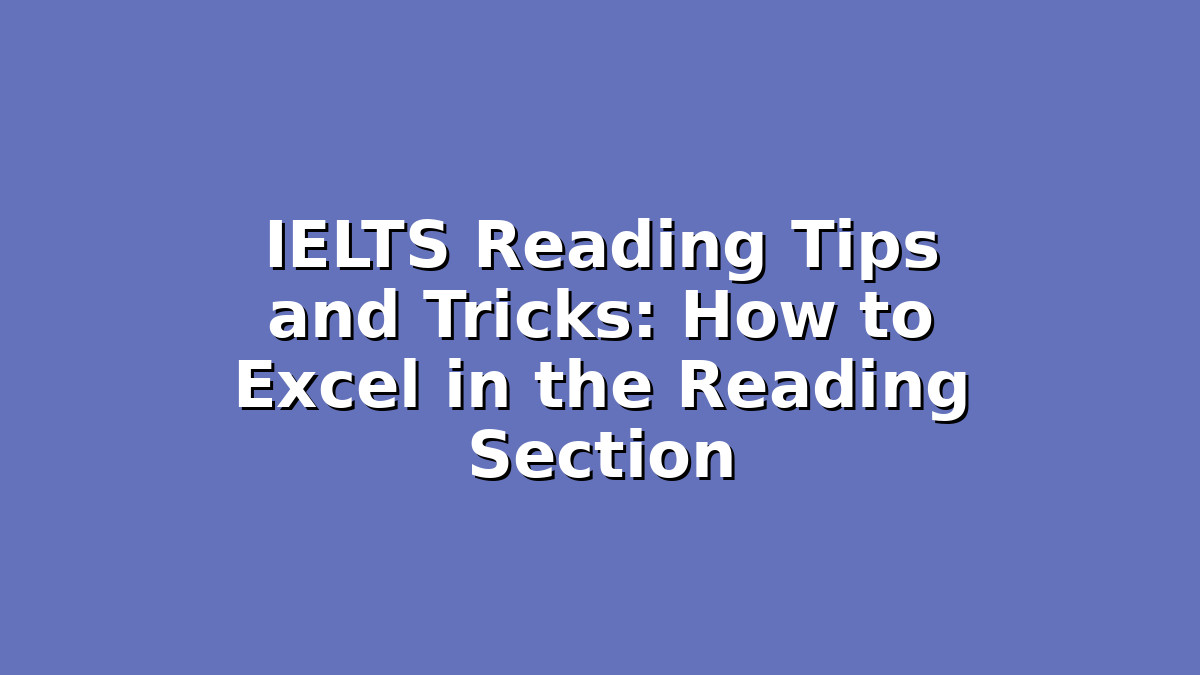Preparing for the IELTS exam can feel overwhelming, especially when it comes to the Reading section. Many students find this part particularly challenging due to the complex texts and time constraints. However, with the right strategies and a focused study plan, you can improve your reading skills, boost your confidence, and achieve a high score. In this article, we’ll explore essential IELTS reading tips and tricks tailored for students aiming to excel in this section. Whether you’re taking the Academic or General Training module, these practical advice and techniques will help you navigate the reading tasks efficiently and effectively.
Understanding the IELTS Reading Section
Before diving into the tips, it’s important to understand the format of the IELTS Reading test. You’ll have 60 minutes to answer 40 questions based on three reading passages. The passages can vary widely in topic and style, ranging from descriptive and factual texts to discursive and analytical articles. The questions test a range of skills, including skimming for main ideas, scanning for details, understanding vocabulary in context, and recognizing the writer’s opinions or attitudes.
Given the time pressure, many students struggle to complete all questions accurately. This makes it crucial to develop smart reading strategies and practice regularly. Let’s explore three detailed sections that can transform your approach to IELTS reading preparation.
—
1. Master Skimming and Scanning Techniques
Two fundamental skills in the IELTS Reading section are skimming and scanning. These techniques help you quickly locate information without reading every word, saving valuable time.
– Skimming involves reading the passage quickly to get a general idea of the content and structure. Focus on the introduction, headings, the first sentence of each paragraph, and the conclusion to understand the main points. This overview helps you anticipate where specific information might be located.
– Scanning is about looking for particular facts, keywords, or numbers. When you know what you’re searching for—such as a date, a name, or a specific term—your eyes move rapidly over the text until you find the relevant detail.
How to practice skimming and scanning:
– Take practice reading passages and set a timer for 2-3 minutes. First, skim through the text and summarize its main idea aloud or in writing.
– Then try scanning by searching for answers to specific questions without reading the entire passage again.
– Use highlighters or underline keywords in practice materials to train your eyes to spot important info quickly.
By mastering these two skills, you’ll be able to allocate your 60 minutes wisely, spending less time on irrelevant sections and more on answering questions accurately.
—
2. Build Your Vocabulary and Understand Context
Vocabulary plays a crucial role in the IELTS Reading section. The passages often contain academic words, synonyms, and paraphrased phrases that can confuse test-takers. Understanding how to decipher unfamiliar words in context is key to answering vocabulary-related questions and grasping the overall meaning.
Tips to improve your vocabulary for IELTS Reading:
– Read widely and regularly. Expose yourself to a variety of English texts, including newspapers, magazines, academic journals, and online articles. This will familiarize you with different writing styles and vocabulary.
– Learn synonyms and paraphrasing techniques. IELTS questions rarely use the exact words from the passage. Instead, they rephrase information. For example, “increase” might appear as “rise” or “growth” in the text. Practice matching synonyms and paraphrased sentences.
– Use vocabulary notebooks or apps. Write down new words along with their meanings, example sentences, and synonyms. Review your list weekly to reinforce retention.
– Guess word meanings from context. If you encounter an unknown word, look at the surrounding sentences for clues about its meaning. Words are often explained or contrasted nearby.
In the test, pay attention to how words function in sentences, such as their part of speech (noun, verb, adjective). This helps you choose the correct answers in fill-in-the-blank or matching tasks.
—
3. Develop Time Management and Question Strategies
Time management is one of the biggest challenges in the IELTS Reading test. You have approximately 1.5 minutes per question, which may feel tight if you’re reading slowly. Developing an efficient approach to tackling different question types can improve your speed and accuracy.
General tips for managing time:
– Don’t spend too long on one question. If you’re stuck, move on and come back later if you have time.
– Answer easier questions first. This builds confidence and secures quick points before dealing with tougher ones.
– Keep track of time. Use a watch or the test’s timer to monitor how long you spend on each passage and question set.
Strategies for common question types:
– Multiple Choice: Read the question first, then skim the passage for relevant info. Eliminate obviously wrong options.
– True/False/Not Given or Yes/No/Not Given: Carefully compare the statement with the text. “Not Given” means no clear information is provided.
– Matching headings or information: Quickly identify the theme of each paragraph before matching. Look for keywords in headings and paragraph content.
– Summary completion or sentence completion: Pay attention to word limits and grammar. Find the sentence/paragraph that relates to the summary and scan for the missing words.
Practice full-length reading tests under exam conditions to build stamina and get comfortable with the pacing. After each practice test, review your mistakes to identify patterns and areas for improvement.
—
Conclusion
Preparing for the IELTS Reading section may seem daunting, but with the right mindset and strategies, success is within your reach. Mastering skimming and scanning will help you navigate the passages efficiently. Building a strong vocabulary and understanding how words are used in context will improve comprehension. And developing effective time management and question-answering tactics will ensure you make the most of the 60 minutes.
Remember, consistent practice is key. Use official IELTS practice materials, take timed tests, and reflect on your performance regularly. Stay positive, patient, and persistent—you are capable of achieving your target score!
Good luck with your IELTS preparation. Keep reading, keep practicing, and believe in your progress!

Responses